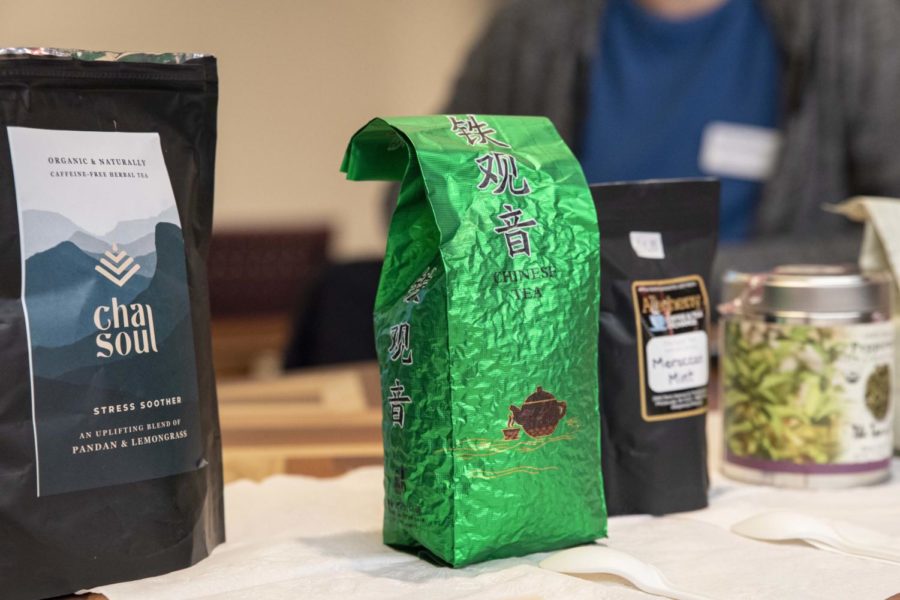The tea on the stress-relieving tea in Posvar Hall
Pitt’s Global Hub, located on the first floor of Posvar Hall, will host a free global tea tasting every day this week from 9 a.m. to noon.
December 8, 2019
A study conducted at City University London found that drinking tea really can relieve stress — a common feeling among students during finals week. For participants placed in a stressful situation, those who weren’t given tea experienced a 25% increase in anxiety, while those who were had a 4% decrease.
Findings like these prompted Pitt’s Global Hub, located on the first floor of Posvar Hall, to host a free global tea tasting every day last week and this week from 9 a.m. to noon.
Global Hub Manager Karen Lue said the tea tasting, which attracts about 15 to 20 students per day, is a perfect opportunity for students to destress and enjoy tea with calming properties from around the world.
“We just thought it would be a nice way for students to just enjoy some free tea and hopefully destress a little bit for finals,” Lue said. “We have teas from around the world — China, Morocco and some other stress-free calming teas.”
The tea tasting features six rotating flavors donated by Pitt’s Asian Studies Center or purchased in the Strip District by Global Hub employees. Emily Higginson, a senior Spanish major, tried a stress-soothing tea from Thailand made with Pandan and lemongrass. She said the tea helped relieve her stress before studying.
“I’m going to go study and it’s something nice to have because it definitely calms me down,” Higginson said. “I always drink tea before bed every night. It’s something nice and warm and comforting especially being in a stressful environment.”
Student employees working at the Global Hub also noticed the tea’s calming properties. Aspen Narvarte, a senior political science major and global ambassador, said one of her favorite parts about working at the tasting was peaking students’ interest in the teas.
“It’s always funny when someone walks by and we’re like ‘Oh do you want some tea?’ and their immediate reaction is no,” Narvarte said. “But then they think about it and they’re like ‘Yeah I would like some tea that would be great.’”
Meghan Dillon, a senior environmental studies major and global ambassador, said she also thinks tea is a great beverage for students, especially before class, which is why it’s one of her favorite events to work.
“My favorite events to work are ones like this that are really interesting and get a lot of traffic,” Dillon said. “Even if it’s a quick five minutes, hurry up and grab your tea and go to class, even in class you can sip on something warm and calm down for a second in between the craziness.”
But the Global Hub’s event goes beyond sampling tea — it also partnered with the Stress Free Zone to offer guided meditation sessions on Wednesdays led by Yoga U owner Laurel Chiappetta. Guided meditation is when participants practice mindfulness techniques under the direction of a trained professional.
Narvarte said the Global Hub’s various calming activities makes it a great place for students to take a break from studying.
“I think overall the Hub doing more stress free things is a good way for students to take a quick break and fix themselves a cup of tea or go meditate,” Narvarte said. “Breaks are super important. If you take a break it can’t just be playing on your phone. You need to relax your brain, because if not, your work will not get better.”
As an alternative to scrolling through social media or YouTube videos, Narvarte thinks brewing tea is a great option.
“Tea is a good way to relax. You get to make it which is why it’s almost like cooking in a sense,” Narvarte said. “It’s relaxing to focus your mind on something else that isn’t work.”
Researchers who published a 2017 study in the science journal “Nutrients” noted that the “anti-stressful effect” of green tea is only measurable if the tea is decaffeinated. The difference between caffeinated and decaffeinated tea is something Narvarte, who was sipping on decaffeinated tea at the Hub, easily noticed.
“I usually don’t drink decaffeinated tea so I usually don’t find tea relaxing because it caffeinates me,” Narvarte said. “It’s definitely the thing I like to drink at night as opposed to coffee because it is a little bit less aggressive.”
Green tea isn’t the only kind of tea that helps alleviate stress. Peppermint tea, which includes menthol, reduces anxiety by lowering blood pressure and body temperature. Chamomile tea is also proven to reduce symptoms of generalized anxiety disorder, according to a study published in the science journal “Phytomedicine.” Black tea can also help to reduce stress levels, according to University College London researchers who studied people who drank it over a six-week period.
But no matter what type of tea students decide to drink this week to relieve stress, Lue suggests making the trip to the Global Hub.
“Come by the hub to enjoy some stress-free mindfulness activities, and make sure to take breaks,” Lue said. “Finals are only a week or two then it’s winter break. This happens every year, it’s not make or break.”








